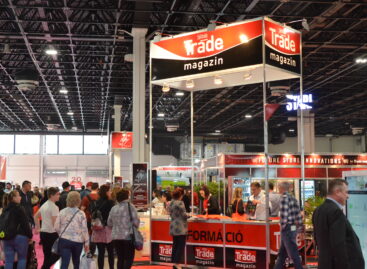With moderate optimism
Ákos Bősze, HoReCa business development executive of METRO presented the results of the wholesaler’s 1,000-respdonent survey at the Business Days conference.
This article is available for reading in Trade magazin 2024/11

Ákos Bősze
HoReCa
business development
executive
METRO
He told that the most important problems for HoReCa businesses are high inflation, overheads and transport costs, while for many labour shortage is just as big a problem. Half of HoReCa businesses are more optimistic than they were in 2023, with the majority expecting sales revenue growth. Half of businesses are hopeful about growth, two-thirds expect growth below 10%, while 15% forecast a decline in sales. 63% of HoReCa actors reported an increase in consumption and 8% registered a decrease. 44% also reported a rise in the number of guests as a secondary effect, while 20% announced a decrease.
How the trade responded
Almost 60% of respondents plan to cut costs, with 27% of them looking to eliminate non-essential expenditure as the main source, a fifth to reduce investment, development and/or marketing costs or to cancel or postpone other planned improvements. 17% seek to cut overheads by reduced or seasonal opening hours and almost the same proportion plan energy efficiency improvement.
A tenth would review existing purchasing partners and an even smaller proportion would lay off staff. In general the sales revenues of HoReCa businesses exceed their expenditure, but for most of them a new investment project is unrealistic.
Needs and preferences
There is a general view that the customer base has become younger in the last two years, with Generation X and Y playing a more important role in consumption in restaurants. Hospitality businesses reported a big decline in restaurant visits by Baby Boomers – consumers aged 60 and older. It seems that offering guests a real experience is a priority for the majority of HoReCa operators in the country. More than four-fifths of Hungarian restaurateurs believe that they can do this with attentive and polite service and by using high quality, fresh ingredients. Nearly 70% reckon that the atmosphere and how the place looks are among the top priorities of guests.
Trends and a vision for the future
Hospitality has recognised that Generation Z is a key player in shaping trends in gastronomy and catering in Hungary too. For these consumers creative and varied cuisine and fresh and quality ingredients are the most important, but for two-thirds the interior design, attentive and polite service and good food styling also matter. The majority of respondents perceived a change in the food choices of their guests: METRO sees a growing trend towards healthier food. 51% of respondents consider it to be crucial to cater for guests with special dietary needs, while 45% see a rise in the proportion of vegan and vegan dishes. Half of HoReCa units saw a change in beverage choice, with 55% experiencing a growth in beverage consumption and 13% observing a drop. The survey reveals that the domestic hospitality supply chain is concentrated, with bars and restaurant working with a small number of suppliers. //
Related news
Tuned to efficiency
🎧 Hallgasd a cikket: Lejátszás Szünet Folytatás Leállítás Nyelv: Auto…
Read more >(HU) METRO Gasztro Fesztivál a SIRHA Budapesten – Élmény, inspiráció és valódi megoldások a HoReCa-szakmának
🎧 Hallgasd a cikket: Lejátszás Szünet Folytatás Leállítás Nyelv: Auto…
Read more >Related news
The Store of the Future opens again at the SIRHA Budapest exhibition! (Part 4)
🎧 Hallgasd a cikket: Lejátszás Szünet Folytatás Leállítás Nyelv: Auto…
Read more >The economic sentiment index deteriorated in the euro area and the EU in February, but improved in Hungary
🎧 Hallgasd a cikket: Lejátszás Szünet Folytatás Leállítás Nyelv: Auto…
Read more >









